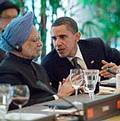 25日甫於美國匹茲堡閉幕的20國集團(G20)高峰會,與會領袖同意逐步廢除化石燃料補貼政策作為中程目標,以配合低收入家庭扶助計畫。他們一致表示,預料這項創新行動可鼓勵能源節約、促進能源安全,並啟動國內事件溫室氣體排放減量的承諾。
25日甫於美國匹茲堡閉幕的20國集團(G20)高峰會,與會領袖同意逐步廢除化石燃料補貼政策作為中程目標,以配合低收入家庭扶助計畫。他們一致表示,預料這項創新行動可鼓勵能源節約、促進能源安全,並啟動國內事件溫室氣體排放減量的承諾。
美國總統歐巴馬在閉幕演說中指出:「我們都同意必須淘汰化石燃料補貼政策,如此我們才能邁向21世紀的能源經濟──這項劃時代的作法,最終將為全球省下將近3000億美元的補貼。」
G20包括阿根廷、澳洲、巴西、加拿大、中國、法國、德國、印度、印尼、義大利、日本、墨西哥、俄羅斯、沙烏地阿拉伯、南非、南韓、土耳其、英國、美國等19國,以及歐洲中央銀行擔任輪值主席所代表的歐盟。該集團所代表的經濟體,能源使用量約站全世界80%
根據國際能源總署(IEA)與OECD組織估算,全世界廢除化石燃料補貼政策後,全球在2050年約可減少10%以上的溫室氣體排放。
廢除補貼政策,也有助於矯正市場扭曲,促進市場在能源效能技術與非化石能源供應方面的投資。
削減能源補貼預期能降低能源消耗與能源進口需求,並可提高能源出口潛力──這都有助於防止未來能源供應短缺的危機發生。例如2008年間,儘管能源價格高漲,實施石油補貼的國家,其需求量仍以每天100萬桶的數量成長。
G20各國領袖表示,消除補貼,才能把資源釋放出來作社會扶助,可大大改善低收入家庭的生活品質。若再搭配國際上普及現代化能源服務的推展措施,將有助於大大降低空氣污染,進而拯救人命。
環保人士讚許這項作為,儘管有些人仍批評這不足以扭轉氣候變遷帶來的災難。像地球之友協會主席皮卡(Erich Pica)就表示:「我們讚揚G20達成協議要終止政府的化石燃料補貼,但仍認為工業化國家錯失良機,未能承諾創見國際級的氣候金融體系,這是讓全球擺脫骯髒化石燃料的關鍵,因為若缺少資金上的承諾,將危害到全球在抗暖化協議。」
自然資源防護協會(NRDC)主席班內克(Frances Bernecke)的態度則較為支持,他表示:「這項承諾意味著,未來為乾淨能源所支付的成本可大大減少。」
G-20 government leaders today concluded the Pittsburgh Summit with a commitment to phase out fossil fuel subsidies over the medium term while providing targeted support for the poorest households. The leaders said that this unprecedented move is expected to encourage energy conservation, improve energy security, and kick-start their commitment to reduce greenhouse gas emissions.
In his closing address to the G-20 leaders, host President Barack Obama said, "We agreed to phase out subsidies for fossil fuels so that we can transition to a 21st century energy economy - an historic effort that would ultimately phase out nearly $300 billion in global subsidies."
The members of the G-20 are the leaders of 19 countries: Argentina, Australia, Brazil, Canada, China, France, Germany, India, Indonesia, Italy, Japan, Mexico, Russia, Saudi Arabia, South Africa, South Korea, Turkey, the United Kingdom and the United States, as well as the European Union, represented by the rotating council presidency and the European Central Bank.
In implementing the phase-out of fossil fuel subsidies, the G-20 leaders recognized that their economies account for over 80 percent of the world's energy use.
Eliminating fossil fuel subsidies worldwide would reduce global greenhouse gas emissions by 10 percent or more by 2050, according to estimates by the International Energy Agency and the Organization for Economic Cooperation and Development.
Removing fossil fuel subsidies helps eliminate market distortions, strengthening incentives for investments in energy efficient technologies and non-fossil energy supply.
Cutting energy subsidies is also expected to lead to reduced consumption, lower import demand and increased availability of energy for export – all helping to reduce the likelihood of a future supply crunch.
In 2008, demand grew in countries subsidizing oil by nearly one million barrels per day, despite high prices.
The G-20 leaders say eliminating the subsidies will free resources for targeted social assistance that could significantly improve the quality of life for low-income households.
Phasing out the subsidies that contribute to unsustainable use of fossil fuels in tandem with international efforts to expand access to modern energy services will make a substantial contribution to the reduction of air pollution and help save lives, they said.
Environmentalists praised the move, although some said it does not go far enough towards averting climate change catastrophe.
Friends of the Earth President Erich Pica said, "We commend the G20 for its agreement to end government subsidies for fossil fuels, but feel that industrialized country leaders missed an opportunity to make real commitments to fund international climate finance. While this is an important step forward in weaning the globe off of dirty fossil fuels, the lack of financial commitments jeopardizes an international agreement on global warming."
Natural Resources Defense Council President Frances Bernecke was more supportive, saying, "This commitment represents a strong down payment for a clean energy future."
全文及圖片詳見:ENS






